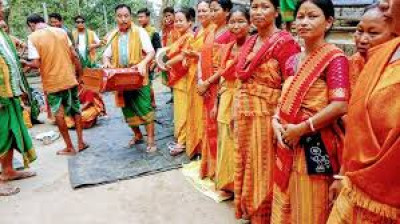History & Traditions
The term Bishu is derived from the Chutiya words Bi meaning extreme and Su meaning rejoicing, symbolizing the festival’s spirit of joy and renewal. Like other spring festivals in Assam, Bohaggiyo Bishu continues for seven days and is filled with traditional rituals, music, dance, and prayers. However, unlike the mainstream Bihu festival, the Deori Bihu begins only after performing the Than Puja, which must start on a Wednesday. This ritual marks the purification of the sacred altar and invites divine blessings for a bountiful harvest and community well-being.
One of the most striking highlights of the Bohaggiyo Bishu festival is the Deodhani Nritya or Deodhani Dance, performed by women believed to be possessed by spiritual forces during the ritual. Their rhythmic movements to the beat of traditional drums symbolize divine energy and spiritual ecstasy. The Husori or Carol Song Party adds another layer of cultural charm—groups of young men and women go from house to house singing traditional songs to bless households and spread joy.
Every four years, the festival includes the ritual sacrifice of a white buffalo during the Than Puja, an ancient tradition believed to substitute the older custom of human sacrifice. The act symbolizes devotion and gratitude to the deities for good harvests, protection, and community prosperity.
Cultural & Religious Significance of Bohaggiyo Bishu
Bohaggiyo Bishu is not only a celebration of the changing seasons but also a spiritual journey deeply connected with the Deori belief system. The festival unites communities through dance, devotion, and festive gatherings, symbolizing harmony between humans, nature, and the divine.
Major Celebration Locations
The festival is prominently celebrated in Lakhimpur, Dibrugarh, Sivasagar, and Nagaon districts of Assam. Each of these regions becomes a hub of cultural performances, community feasts, and religious rituals during the seven days of festivities.
Bohaggiyo Bishu reflects the living heritage of Assam’s indigenous tribes, blending spirituality, dance, devotion, and community joy. The festival stands as a symbol of cultural preservation and a reminder of the deep-rooted harmony between people and nature.
Bohaggiyo Bishu Quick Info Table
| Festival Name | Bohaggiyo Bishu Festival |
|---|---|
| Community | Deori Tribe |
| Region Celebrated | Assam (Lakhimpur, Dibrugarh, Sivasagar, Nagaon) |
| Type of Festival | Cultural, Religious, Spring Festival |
| Duration | 7 Days |
| Main Ritual | Than Puja |
| Major Attractions | Deodhani Dance, Husori Songs, Community Feasts |
| Special Ritual (Every 4 Years) | White Buffalo Sacrifice |
| Time of Celebration | Mid-April (Assamese New Year) |
| Entry Fee | Free |
FAQs on Bohaggiyo Bishu
